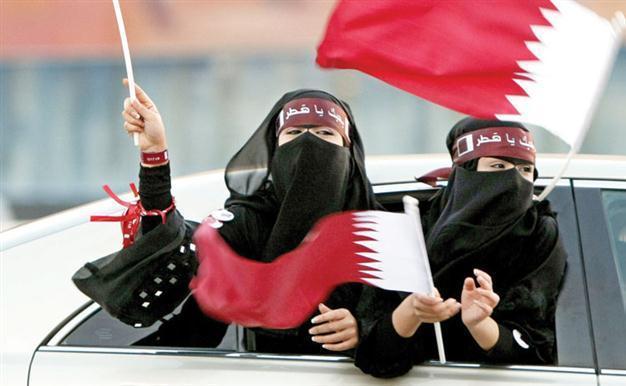Alcohol ban raises questions on Qatar’s World Cup hosting
James M. Dorsey

This file photo from Dec 3, 2010, shows Qatari women waving their national flag during celebrations in Doha, a day after the world football’s governing body FIFA announced that the tiny Gulf state will host the 2022 World Cup. The gulf emirate, future host of the 2022 FIFA World Cup and past playground of several Arab and Asian games, is likely to have problems when trying to handle the alcohol issue during the tournament.
A ban on alcohol on Qatar’s man-made island The Pearl-Qatar coupled with the naming of a large mosque after the founder of a puritan strand of Islam and online protests against various state-owned companies highlights domestic opposition to some of the Gulf state’s more forward looking policies as well as freedoms for football fans it is expected to host during the 2022 World Cup.
Qatari officials have said the 500,000 football fans expected to descend on their country during the World Cup will be allowed to consume alcohol in designated zones. Alcohol is currently served exclusively in hotels and sold in a Qatar Airways–owned shop only to expatriates who hold a license.
The banning of alcohol on the island, whose restaurants are popular with Qatar’s growing expatriate community, was introduced in advance of the Al-Kass International Cup, a 10-day under-17 football tournament, involving top world clubs such as Paris Saint-Germain, Brazil’s Vasco da Gama, Juventus, Ajax, FC Barcelona, Japan’s Kashima Antlers and Egypt’s Al-Ahly. It also came as senior international figures gathered in Doha at Qatar’s invitation to brainstorm over the role of sports in society and what governments, NGOs and the private sector should do to promote sports.
Business at restaurants on island Pearl has dropped by as much as 50 percent as a result of the ban. “Obviously the business has dropped; by half for some restaurants, probably even more,” said Sumeet Jinghan, country manager for Foodmark, whose brands include Carluccio’s, The Meat Company and Mango Tree.
Mr. Jinghan said Foodmark had suspended plans to open two more restaurants and a club on the Pearl, home to an estimated 41,000 residents, until it became clear whether the ban was permanent.
The ban didn’t immediately affect the Al-Kass tournament, which primarily attracted only local spectators. The competition offers Aspire Qatar, the Gulf state’s youth team, whose players include young Qataris as well as youths from Africa, Asia and Latin America selected in a yearly talent search from among 500,000 aspiring kids playing football to compete against some of the world’s best teams.
Cornerstone in diplomacy
The tournament is one initiative in Qatar’s emphasis on sports as a cornerstone of its foreign policy, development and effort to shape the energy-rich nation’s national identity at a time that youth-driven popular revolts have toppled the leaders of Tunisia, Egypt and Libya and pushed embattled autocrats in Syria and Yemen to the brink. Qatar’s Al Jazeera television network has played an important role in the revolts, with Syrian President Bashar al-Assad accusing it of instigating and encouraging the protests against his regime.
“Our goal is to create a dialogue that resonates with and talks to the youth. This is an opportunity to inspire and engage young people. Sports are at the heart of Qatar’s development. Sports like education and arts are part of our national identity,” said Noora al-Mannai, CEO of Qatar’s bid to win the right to host the 2020 Olympic Games. Ms. al-Mannai said “empowering young people” was one reason for the bid alongside Qatar’s efforts to mediate conflicts and reduce regional obesity and diabetes levels.
If sports are for Qatar’s leaders a key tool in forging national identity, banning alcohol is its equivalent for more conservative and nationalist forces in the Gulf state.
“I don’t see a reason to have alcohol. It impacts very negatively on locals. Locals are not happy with it,” Qatari writer Abdul Aziz al-Mahmoud said, according to The Wall Street Journal.
Conservative Qataris worry that an increasing number of their compatriots, often dressed in full-length robes, the Gulf’s national dress, drink publicly in hotels and bars. “It is a taboo in Qatar to see somebody wearing the national dress and drinking,” said Hassan al-Ibrahim, a Qatari commentator, The Wall Street Journal reported.
In a nation where locals account for at best one third of the population, conservative fears were further inflamed when the Qatar Distribution Company, a Qatar Airways owned-retail shop, introduced pork alongside the alcohol it was already selling to expatriates. The introduction was one spark for an online call to boycott the airline.
Qatar’s The Peninsula daily reported a group of 500 Qataris had called for a boycott of the state-owned airline, a major tool in the positioning of the Gulf state as a global travel hub, in protest against its serving of alcohol on flights, high fares and failure to allocate more jobs to Qatari nationals. The protesters’ campaign featured the Qatar Airways logo with a “no entry” sign superimposed on it. It followed a similar protest in recent months decrying telecommunications services.
Qatar Airways has declined to comment on why its store had started to sell pork.
“I never thought the day would come that I have to ask the waiter in a restaurant in Qatar what kind of meat is in their burgers,” said one Qatari on Twitter. “People don’t get it. It’s not about the pork. It’s about us feeling more and more like a minority in our own country,” another Qatari tweeted.
